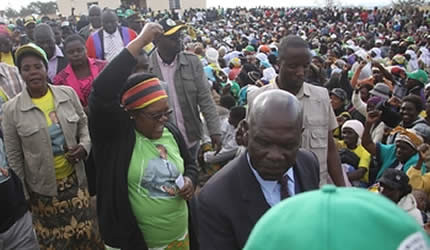
Republic of Zimbabwe Vice-President Joice Mujuru at Domboshava rally on July 22, 2013. She is campaigning for ZANU-PF., a photo by Pan-African News Wire File Photos on Flickr.
Zesn: The West’s Trojan horse
August 7, 2013 Opinion & Analysis
Zimbabwe Herald
The Zimbabwe Election Support Network convened a Press conference at the Holiday Inn in Harare on August 1 2013 where it tried to discredit the peaceful, free and fair harmonised elections. Commenting on the elections, ZESN said that “generally the environment was relatively calm and peaceful. Based on the empirical reports from our observers, regardless of the outcome, the credibility of the 2013 harmonised elections is seriously compromised by a systematic effort to disenfranchise an estimated million voters.”
The western media jumped on to this declaration by ZESN to discredit the election disregarding the views of independent observer missions such as the African Union and Sadc. The question has to be asked, who is ZESN whose views command greater authority than those of Sadc and the AU?
ZESN was founded in the year 2000 as a coalition of 31 non-governmental organisations, which claim to co-ordinate activities pertaining to elections. It is a project that coalesces a host of pro-MDC-T and regime change agenda civil society organisations (CSOs) such as the Election Resource Centre (ERC), Zimrights, Bulawayo Agenda (BA), Zimbabwe Peace Project (ZPP), Zimbabwe Civic Education Trust (ZIMCET), National Constitutional Assembly (NCA) and the Zimbabwe Congress of Trade Unions (ZCTU), among others, around the issue of elections.
It touts itself as a network which promotes “democratic processes in general and free and fair elections in particular,” but its conduct points to the contrary.
From the onset, the organisation was founded and funded by the west. It receives its funding from organisations such as the European Commission, United Nations Development Programme (UNDP), USAID, Japan Foundation, Australian Government Overseas Aid Programme (AUSAID), Canadian International Development Agency (CIDA), Swedish International Development Agency (SIDA) and Danish International Development Agency (DANIDA). These organisations receive direct funding from the governments of the US, Britain, Sweden, Denmark, Canada and Japan.
These CSOs are in the business of profiting from pro-regime change activism. They can only remain relevant, both financially and politically, if there is a perception of political instability in Zimbabwe. Western countries are willing funders of these local regime change fronts such as ZESN in their quest to dislodge Zanu-PF from power.
This explains why the agenda ZESN sought and continues to propagate resonates with the regime change thrust of its funders. This is in keeping with the old adage, he who pays the piper calls the tune. Ironically, NCA chairperson Professor Lovemore Madhuku distanced himself and his organisation from the adverse ZESN report. The NCA, which contributed 1 200 of the 5 000 ZESN observers, declared that: “The NCA is not ZESN. It is a member of ZESN. It is not bound by everything that ZESN says.” He added that the election was peaceful, free and fair, hence the losers should concede defeat and go back to the drawing board.
Under the leadership of its national director, Rindai Chipfunde Vava, ZESN received in excess of $5 million from these donors in the run-up to the July 31 2013 harmonised elections. The money was to be used to influence the election in favour of the MDC-T through voter education, voter registration, a citizen journalism programme and training of long-term observers (LTOs). One of the Stanbic accounts, 0222062852205, between September 19 2012 and April 1 2013, received a total of $277 000 for salaries and rentals.
By any stretch of the imagination, it is absurd to suggest that a million “ZESN ghost voters” were allegedly disenfranchised, who presumably are perceived by that organisation to be MDC-T supporters. How this alleged systematic disenfranchisement was allegedly done is neither chronicled nor explained.
Ironically, the same ZESN, which said that the environment was “peaceful and calm” makes ludicrous claims that, “when compounded by the massive bias in the State media, the campaign of intimidation in rural areas, the lack of meaningful voter education, the rushed electoral process and the harassment of civil society leaving the credibility of these elections severely compromised.” How does ZESN reconcile a “peaceful and calm” environment and “campaign of intimidation”? What bias is ZESN referring to when the ZBC abdicated all political programming to ZEC in compliance with the Electoral Act?
The same could not be said of the private media, which only lampooned Zanu-PF and campaigned for the MDC-T. In its preliminary report, Sadc noted that, “the mission has observed that State and private media in Zimbabwe is highly polarised.” The AU echoed the same sentiments highlighting that, “the media was highly polarised along party lines.” Essentially, political parties enjoyed equal coverage as a result of polarisation, although the MDC-T got one better as it received positive coverage from the State, registered private media and pirate stations, giving it an unfair advantage over other parties, Zanu-PF included.
ZESN’s position as outlined above is in sync with the position of its funders namely Britain, America and Australia, who have all described the poll as peaceful but marred by irregularities. It is not difficult to understand the negative pronouncements being propagated by ZESN, which seeks to discredit a poll that has been lauded by the AU, Sadc, African Caribbean Pacific (ACP) group of nations, Comesa, all African institutions, as peaceful, free, fair and credible despite a few irregularities.
No comments:
Post a Comment